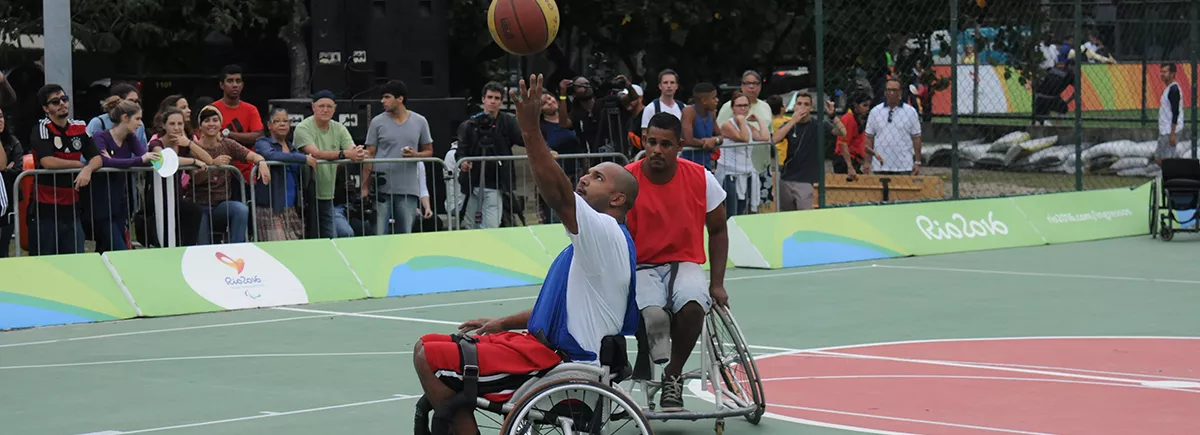
What are the public and media challenges for Paris 2024?
Related project
Paris Médias 2024Combating racism, talking about all sportsmen and women, raising awareness among young people of the information in clubs... These are the public and media challenges facing the forthcoming Olympic and Paralympic Games, as discussed at the recent International Journalism Conference in Tours (France).
An overview, 100 days before the start of the Paralympic Games.
"On the track, there are no whites or blacks. Only fast and slow!"
This quote is from Jesse Owens, the black American sprinter and long jumper who won four gold medals at the 1936 Berlin Olympics under the nose and moustache of a certain Adolf Hitler... Yet according to the French association of anti-racist and racialised journalists (AJAR), the race is still far from over: "We have to be careful not to unwittingly reproduce clichés that are then repeated by the public, such as 'the athletic prowess of Blacks', 'the tactical intelligence of Whites', or the 'small and passive' Asians".
The aim is to avoid, at all costs and all over the world, the broadcasting of a nauseating potpourri of blunders by sports commentators, who can be champions of misogynistic black caricature, the double discrimination, both sexist and racist, experienced by black champions like Serena Williams.
In France, ahead of the 2024 Paris Olympic and Paralympic Games, the Regulatory Authority for Audiovisual and Digital Communication has also sounded the alarm in a report published at the end of 2023: "The amount of airtime devoted to men's para-sports is three times greater than that devoted to women's para-sports. This difference is comparable to that observed for able-bodied sport. This means that disabled sportswomen are under-represented for two reasons”.
Investing in all areas
What if the Olympic Games, at least once every four years, were an opportunity to change attitudes? "For the first time, all 22 official sports of the Paralympic Games will be filmed and broadcast live. And these sports will be commentated by the same journalists commentating the Olympic Games", promises Guillaume Papin, a journalist with France Télévisions, the official broadcaster of this double global event. Ryadh Sallem, a member of the French Paralympic Sports Committee and a sportsman who has experienced six Olympiads, appreciates how far things have come: "Thanks to the media, people are no longer ashamed of being disabled. But we have fought to stop the terms 'able-bodied' and 'non-able-bodied' from being used. Why not use the term 'ordinary and extraordinary’ to add a little poetry?"
Julien Soyer, former table tennis champion and sports journalist with the newspaper Ouest-France, encourages young journalists to be professional rather than overly sympathetic: "Dare to ask us why we didn't achieve what we set out to do, instead of just congratulating us on our silver medal!"
In the run-up to the Olympic Games, some people are calling for a change in perspective to change the way we look at things. "Faced with the spread of fake news and conspiracy theories, we need to invest in all areas and reach out to the clubs. Sports news, which is very popular with teenagers in particular, is a good entry point for media education. Sports journalists have a strong following, their voice carries a lot of weight with young audiences", urges Damien Fleurot, chairman of Lumières sur l'info, an association active in sports clubs that comprises around 80 French journalists. In a manner of speaking, they are the Olympic village’s influencers, like the Du Nku in Togo's Ewé region, lovers of truth and respectful of their community’s values.
Text: Emmanuel de Solère Stintzy
Paris Médias 2024, a project to promote women's sport in the Arab world
CFI's mission is to help ensure equal media coverage for all by launching its Paris Médias 2024 project last March, specially designed for the Olympic and Paralympic Games. Fifty journalists from sub-Saharan Africa and the Arab world will be trained to cover major sporting events and then received in Paris to cover the Games as part of a temporary editorial team.
One aspect of the project involves training the host journalists to include the performances of Paralympic sportsmen and women in their articles, as they are severely under-represented on satellite channels, particularly in the media of North Africa and the Middle East.
For more information: paris-medias-2024


